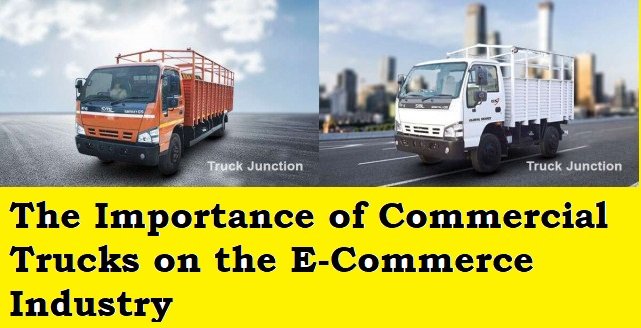Is E-commerce Sector Enabling the Trucking Industry?
The expansion of e-commerce in India is generating a suitable atmosphere for developing e-commerce logistics. By 2027, the Indian e-commerce logistics industry will be worth $11.5 billion. To meet this continued growth, e-commerce titans and retail outlets collaborate with third-party logistics (3PL) suppliers, logistics aggregator sites – transport communities, and marketplaces.
As a result, they assist them in lowering operational costs and time spent on shipping-related operations. Also, road transportation represents the most significant portion of the Indian e-commerce logistics sector in terms of service requirements for these e-commerce performers. In 2019, road transport accounted for approximately 64% of total freight transportation in India. This share currently accounts for 85% of the entire logistics sector.
The change in how we shop has had an impact on the transportation industry, along with the trucking industry. Now, let’s take a look at how commercial trucks are getting benefits from the eCommerce sector.
The Impact of E-commerce on the Transportation Industry
The e-commerce industry is more productive than ever and significantly affects transportation. It had a massive influence on other sectors, such as logistics. As a result, the global logistics economy for e-commerce is supposed to surpass $726 billion by 2020.
In this competitive atmosphere, as consumer demand grows by the day, businesses such as FedEx are launching various fulfilment services to achieve a worldwide network.
Vendors and distribution companies are searching for new ways to conduct trouble-free shipping. Various logistics businesses are introducing several innovations to make the experience as progressed as possible. They even deliver perishable items within two hours of receiving an order.
The E-commerce market has boosted the trucking industry. According to some projections, B2C e-commerce will yield $3.2 trillion in revenue by 2020, whereas the B2B e-commerce industry will be half that size.
Making the Business Connect Professionally
Trucks like SML Isuzu Samrat are used by business owners operating e-commerce companies to move freight from one storage facility to another to supply goods to retail stores, food shops, and other industries. They also deliver large items to buyers’ homes, such as furniture and automobiles.
Furthermore, companies will require dependable transportation and logistics to ensure the partnership’s accomplishments if they collaborate. Trucking companies can inevitably assist in making this feasible by providing dependable truckers and high-quality vehicles for the job.
Increased Emphasis on Timely Delivery
Another way the LTL shipping industry responds to the requirements of e-commerce is by exceeding the speed limit of the delivery operation. Online users are accustomed to free and expedited delivery. One of the main reasons many buyers prefer online shopping is the availability of free shipping. As a result, forwarders are reorganizing their operational processes to speed up product delivery. Delivery companies are now going to operate distribution centres near major metropolitan areas. Shippers can ensure faster deliveries by maintaining shipments closer to the delivery market and using LTL shipping.
Trucking Industry Alone Making a “BIG” Difference
Truckers are a large workforce who play an essential role in the supply chain. The most remarkable aspect that distinguishes these truckers as frontline workers is that they deliver imperative commodities on a routine and scheduled basis throughout great distances. They turn up daily with the same devotion and conquer daily difficulties on the highway, occasionally trying to connect with dear ones while also being away from family most of the time.
When you consider the modifications they contribute to making and how they continue to drive regardless, you realize how vital each truck driver is in their own right. They ensure that critical items such as medications, emergency hospital instruments, inorganic chemicals, hygiene products, groceries, and agricultural products arrive on time via intended routes.
Thanks to the Adoption of Digitization
The logistics sector has decided to open up to using emerging innovations to compete with the industry’s veterans. In the post-pandemic universe, where many buyers buy their products digitally, using Big Data solutions in transportation has become invaluable. Big Data enables freight forwarders to collect and analyze data in real-time to improve customer service.
Furthermore, we are seeing an increase in the utilization of electronic payment methods such as credit cards, mobile phones, and online payments. Independent freight forwarders who rely on the e-commerce industry use digital sites for market forecasting and analysis. These portals also aid in the development of a greater understanding of client expectations. Another significant change managed to bring about by the emergence of e-commerce is mobile integration.
The Rise in Technology & Innovation
Several technological advances in recent years have aided the heavy truck market to become more productive. As a result, a trucking company can stay competitive more efficaciously with other firms and large online seller fleets by being more productive.
Route optimisation aids in the reduction of unwarranted miles between points. Truck drivers can eliminate fatal truck crashes by using safety devices such as driver assist, collision mitigation, and forward-looking camera systems. Many trucking companies and retailers bear a high cost due to truck fatalities.
Electronic logging devices, which are now needed on the majority of commercial vehicles, assist in preventing some trucking companies and truckers from outstripping legal driving hours. Going to exceed those hours was one way some businesses tried to gain an advantage over their competitors by encouraging faster delivery dates for goods.
Final Thoughts
The need of the hour is for virtual and dependable ecosystems that are deeply integrated with end-to-end solutions while retaining the needs of the trucking community at the forefront. As omnichannel retail reshapes the fate of operational e-commerce processes, technology platforms concentrated on digitizing the road transport industry will be critical to staying ahead of the game.
These would help road transport players, such as SMEs and lorry owners, understand the ever-changing challenging environments, identify seasonal demand spikes, and improve coverage to rural demand centres. It will also assist all transport industry players in contributing to India’s logistics cost reduction and ease of business while allowing automobile manufacturers to produce more efficient trucks like SML Isuzu Sartaj.
And India’s e-commerce growth will be influenced partly by the smoother transformation from a fragmented, unorganized, and small-scale transportation ecosystem to a community-driven, digitally enabled, efficient transportation ecosystem.





